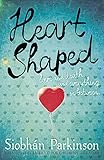
Price: £6.99
Publisher: Hodder Children's Books
Genre: Fiction
Age Range: 10-14 Middle/Secondary
Length: 208pp
Buy the Book
Heart Shaped
I suppose most of us closed the door on our adolescent years when we were about 17 and hoped to avoid revisiting them too often. Siobhan Parkinson, Ireland’s former Children’s Laureate, re-opens that door as well as anyone. The voice of her 14-year-old narrator, Annie, seems absolutely authentic when she says, ‘I just get these ideas and I have to see where they go. That’s all. That’s allowed. Or at least it should be. In an ideal world. Which I realise this is not.’ Of course, she isn’t some representative of adolescence. She is a girl in a unique and, as it happens, very tough spot in a modest district of Dublin. She’s resilient too, which is just as well since within 10 pages she has broken into a neighbour’s house (as you would if you were desperate for the loo) and found a dead body.
Readers of Bruised know half the story of Heart Shaped before they begin, though that memorable novel is not required reading here. Then, we saw things through the anxious eyes of Jonathan Kinahan who, with his young sister, flees Dublin and his violent, drunken mother. It was her corpse that Annie found, and now events unfold from her perspective. She turns for comfort to her loving but nonplussed Dad; and to her best friend, the likeable Emma, whose inclination is for romance rather than realism. Annie’s got no Mum to ask for help for she has found a body before; when she was eight, she came home to discover her mother lying cold in bed. She has never managed to understand, let alone come to terms with that shock. She faces more immediate problems too, in the groping hands of Keith (‘Turdface’) Butler and the The Toad, a caricature of a non-listening Principal; except we’ve all met the odd Head like Toady outside fiction. Above all, she is worried to distraction as to where Jono, who may or may not be her boyfriend, has got to. Her saving strength is that she can view this assortment of difficulties with ironic amusement – not at all the throw-away wit of too many books published for teenage readers. It’s useful in a narrator too that she enjoys words for themselves. At school, she’s coming fresh to Shakespeare, Austen et al, who along with a human being of an English teacher, help her to reach some insights about her own predicaments.
Finding out who her mother was and why she took her own life, and finding out who Jono is – as well as where he is – become the twin pursuits which drive Annie through the book. The cast is small and the focus upon Annie’s state of mind remains tight. Her regular meetings with therapist ‘Dr Thing’ enable us to read her shifting thoughts as coherently as she does herself. Parkinson’s skill is to tell a story in which not too much happens and the setting is superficially mundane – there is drama but no melodrama (no teenlit set piece crescendos here) – and yet keep us very concerned about how Annie is coping. Her increasing self-awareness and courage as she steers her way through her inner tempests make for an absorbing and finally optimistic read.



